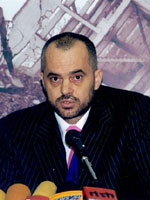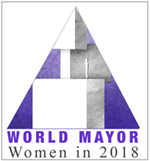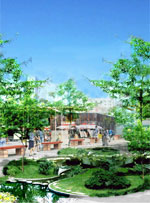
Edi Rama, Mayor of Tirana and winner of the 2004 World Mayor award

FRONT PAGE
About us


Please nominate your candidate for the 2018 World Mayor Prize

The 2010 results
The 2010 project
The 2010 finalists
Code of Ethics
The World Mayor Prize

The 2008 results
The 2008 project
The 2008 finalists
The World Mayor Award
Helen Zille says thank you

The 2006 results
Methodology
The 2006 finalists
The World Mayor Award

The 2005 results
Contest methodology
List of finalists
Mayor Rama writes - Mayor Bakoyannis replies

The 2004 contest
List of all 2004 finalists
Edi Rama wins 2004 award
People ask - Edi Rama replies
Why we voted for the Mayor of Tirana
Why we voted for the Mayor of Mexico City
History of Tirana

Front Page
Site Search
About City Mayors
Edi Rama, Mayor of Tirana
By Nick Swift
The journey of Edi Rama, winner of the City Mayors World Mayor 2004 contest, to the mayor’s office in Tirana, the capital of Albania, arguably began in what most would call a raw and rough-and-tumble way inasmuch as, even though he, while still teaching at the Albanian Academy of Arts – admittedly a site of political ferment after the termination of communism and the birth of the Democratic Party in 1990 – had quickly left what he considered a bogus movement, and was doing no more than criticize both the socialists and the democrats in print, someone showed how seriously they took that by lying in wait for him in front of his home and beating him nearly to death. Mr. Rama is in no doubt that his attackers that night in 1997 were sent by then-president Sali Berisha.
When he had finally regained his health, Edi Rama resumed his career as a painter and sculptor in Paris, but returned to Albania in 1998 when his father died, and after a new government under Fatos Nano had assumed power. The country then was the product of half a century of Stalinist dictatorship topped off with ten years of free market indiscipline, and layered with organized crime. The capital itself was mired in the waste of under-served overpopulation, with corruption in the civil service having facilitated the emergence of a chaos of illegal buildings and decaying streets.
On the evening of the day in the morning of which Mr. Rama attended the service for his father, the phone rang, and it was Prime Minister Nano, who addressed him as ‘Mr. Minister of Culture’. Mr. Rama heard the call of duty, and answered, he says, without thinking. He soon found the straight-laced aspect of his role disagreeable, and it turned out that becoming (after getting permission) tieless was only the beginning; the restoration of blood flow to the future mayor’s head gave him the idea of opening movie theatres in Tirana, and showing popular foreign films in them, an entirely new phenomenon for Albania.
In October 2000, Mr. Rama ran as an Independent with Socialist Party support for the job of Mayor of Tirana, and won with a 54 per cent majority.
Within a month there was another attempt on his life when shots were fired into his flat.
Any idea of the artist as impractical dreamer is shattered by Edi Rama’s achievements so far. He claims still to be an artist first and most of all, and activities in public service are an extension of his aesthetic sensibility into the realm of action and life. He shrewdly appraises the legacy of communism as a cultural and social toxin that cannot be eliminated except over time, and perhaps a very long time. But he is helping restore Tirana society’s immune system and positive attitude by, for example, the Return to Identity Programme, ruthlessly razing the haphazard and, often, environmentally seriously damaging outlaw buildings of all kinds in order to produce a clean slate on which urban planning can occur that will meet the needs of present and future generations.
He allied himself with the United Nations Development Programme in 2001, and launched the Clean and Green project in Tirana to deal with the consequences of the pollution of the Lana River, generating new green spaces and thousands of new trees. He has reduced unemployment, partly by putting Tiranans to work on such projects. Two years after becoming mayor, Edi Rama went to New York to collect the Poverty Eradication Award from United Nations Secretary General Kofi Annan. “I see this,” he told Voice of America TV in Albanian, “as an important event for the capital rather than my personal life... This award represents recognition for a coordinated effort among many individuals and a synergy of energies and financial resources.”
The depth and breadth of Mayor Rama’s vision and accomplishments to date belie the criticism that he is over-preoccupied with merely cosmetic changes, and that he illegitimately extends the legitimacy of his fondness for colourful shirts to a penchant for painting dull public buildings in the ‘Edi Rama colours’ of green, violet and yellow. The concise version of his reply to that charge is that it is, in essence, all to make the best possible impression on the sort of people Tirana and Albania have the most to gain by impressing favourably: foreign VIPs.
It is not as if he is unaware that the gaiety of those appearances is counterbalanced by the severe poverty that is the more apparent the farther one travels from the city centre.
Focusing the correctness of his politics on forms of integrity that matter to his constituents means that the tendency of his staff to be female and pulchritudinous should be, as far as he is concerned, of no significance in view of the fact that they do their jobs well.
The Democratic Party of Albania in 2003 attempted to have a parliamentary commission established to investigate use of public funds by the municipality of Tirana, evidently with the intention of undermining Mr. Rama’s chances of being re-elected later in the year. They lost inasmuch as the commission, as a condition stipulated by the Socialist Party, will investigate as far back as 1992, when the Democrats themselves were in power. In October, in an election the technical imperfections of which the government candidly acknowledged (and that led to repeat elections in December in about 30 per cent of the country), Edi Rama was re-elected Mayor of Tirana.
He also joined the Socialist Party, encouraging speculation that he and they have set their sights on Mr. Rama becoming Albania’s prime minister one day. The importance of local government itself in Albania has been greatly enhanced by its signing of the European Charter of Local Self Government and by financial decentralization, but party loyalty can still interfere with the realization of the goal of benefiting citizens. The ardour with which Edi Rama is embraced by so many Tiranans (and Albanians) needs no explaining in view of his obvious commitment to a form of politics impatient with such interference.
In his address to the Religion, Science and the Environment movement’s Adriatic Symposium in June 2002, he expressed his vision and showed how it is rooted in the sensibility of the artist and philosopher. Speaking of the communist period in Albania, he referred to it as a “barbaric collectivism” that was followed by a “wild individualism”.
“We realised that communism with its propaganda and its way of dealing with humans had made us enemies of the natural environment, because the natural environment that was called ‘state property’ had been perceived as the property of the ‘enemy’... But we have to analyse this process, and to understand that it has not been the result of releasing ‘wild people’ from a cell. It is part of a long story of humiliation that disconnected individuals from their own communities and that suffocated any sense of belonging to nature, to the land, to our common space...
“Creating a new sense of belonging – belonging to the public space, to nature, to our community, to whatever it includes – is a very big effort. And we have to face many obstacles... The return has started...
“We now have to start – and we have already started – to build a sense of belonging to the space that is in between ‘my house’ and ‘the other’s house’...
“My big concern as the Mayor of a city in the middle of Europe is that I have heard a lot from other Europeans, from Western intellectuals and journalists, about ethical values. Yet I have the terrible feeling that these ethical values are not operational, that they are like a special dish to be placed before gatherings of intellectuals – but that they no longer nourish those beyond. Others are ready to eat a tree because they have nothing to eat, or to destroy everything because they still have not realised that what is not private is common and not the other way around.”
Some facts about Edi Rama, Mayor of Tirana
Mr. Rama is President of the Albanian Municipalities Association. In addition to being a politician, he is an artist and a publicist. He is a founding member of the Movement for Democracy, a political group that played a determining role in the struggle for democracy in Albania during the years 1996 and 1997. He is a founder and key member of the democratic movement that brought about the collapse of the communist state in the period from 1990 to 1992.
His articles and analyses have appeared in many newspapers and magazines, including Klan Magazine, the largest magazine in Albania, and in the largest Albanian newspapers, such as Shekulli and Koha Jone, as well as in The New York Times, The Guardian, Panorama, Frankfurter Allgemeine Zeitung, The Independent, and in World Link Magazine, a publication of the World Economic Forum, which selected him for its Dream Cabinet for 2002, along with other world political personalities, including then Mayor of New York Rudy Giuliani.
Exhibitions of Mr. Rama’s paintings have been held at the Janos Gallery, New York (1993), Place de Mediatheque, France (1995), Palais Jalta, Frankfurt (1997), Acud, Berlin (1993), in Sao Paolo, Brazil (1994), and at the National Gallery (1992) and Gallery XXI (1999) in Albania.
He has been a professor of arts at the Albanian Academy of Arts, and he has had two books published.
He is a former Board Member of the Open Society Foundation, Albania, a non-profit foundation that promotes democracy and open market reforms that was established and is financed by financier and philanthropist George Soros. Currently he is a member of the Regional Advisory Board of the United Nations Development Program.
In October 2002, on the occasion of the International Day for the Eradication of Poverty, Mayor Rama was given an award for his work on environmental issues that has contributed to fighting poverty at the United Nations Headquarters by the Secretary General Mr. Kofi Annan.
In February 2003, Mayor Rama was chosen to serve as the Year 2002/2003 Robert C. Wood Visiting Professor of Public and Urban Affairs at the University of Massachusetts in Boston.
In October 2003, Mayor Edi Rama joined the Socialist Party of Albania.

Future vision of Tirana: The Mayor aims to make the Albanian capital a green and clean city on the Adriatic
Introducing
World Mayor
The City Mayors Foundation, the international think tank for local government, organises the World Mayor Project and awards the World Mayor Prize. The Prize, which has been given since 2004, honours mayors with the vision, passion and skills to make their cities incredible places to live in, work in and visit. The World Mayor Project aims to show what outstanding mayors can achieve and raise their profiles nationally and internationally.
The organisers of the World Mayor Project are looking for city leaders who excel in qualities like: honesty, leadership and vision, management abilities and integrity, social and economic awareness, ability to provide security and to protect the environment as well as the will and ability to foster good relations between communities from different cultural, racial and social backgrounds. The winner receives the artistically acclaimed World Mayor trophy, while the two runner-ups are given the World Mayor Commendation.
Mayors wishing to be considered for the World Mayor Prize will be asked to sign up to the City Mayors' Code of Ethics
Timetable
Nominations were accepted until the 17 May 2012. A shortlist of 25 nominees was published on 18 June. Voting took place until 20 October . The winner of the 2012 World Mayor Prize and other results of the World Mayor Project were announced on 8 January 2013.
Winners and runners-up
2004 to 2012
In 2004: Winner: Edi Rama (Tirana, Albania); Runner-up: Andrés Manuel López Obrador (Mexico City, Mexico); In third place: Walter Veltroni (Rome, Italy)
In 2005: Winner: Dora Bakoyannis (Athens, Greece); Runner-up: Hazel McCallion (Mississauga, Canada); In third place: Alvaro Arzú (Guatemala City, Guatemala)
In 2006: Winner: John So (Melbourne, Australia); Runner up: Job Cohen (Amsterdam, Netherland); In third place: Stephen Reed (Harrisburg, USA)
In 2008: Winner: Helen Zille (Cape Town, South Africa); Runner up: Elmar Ledergerber (Zurich, Switzerland); In third place: Leopoldo López (Chacao, Venezuela)
In 2010: Winner: Marcelo Ebrard (Mexico City, Mexico); Runner-up: Mick Cornett (Oklahoma City, USA); In third place: Domenico Lucano (Riace, Italy)
In 2012: Winner: Iñaki Azkuna (Bilbao, Spain); Runner-up: Lisa Scaffidi (Perth, Australia); In third place: Joko Widodo (Surakarta, Indonesia)
